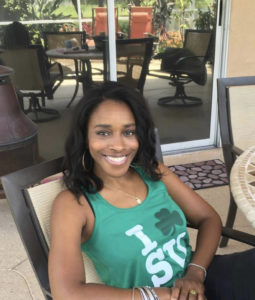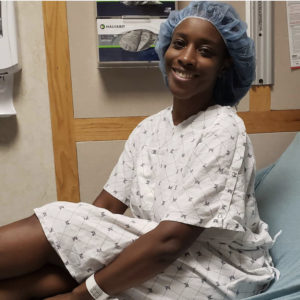Is there a better time of life than 22? All the possibilities of life are before us, ready to be explored. In 2003, Jacqueline Smith was just 22, fresh out of college and ready to take on the world when she received devastating news; she had Stage III melanoma. What? How could that be? She was young! She didn’t tan! She is a woman of color. How could she have melanoma?
Now, all these years later, Jacqueline shares her story in the hope it raises awareness that everyone is at risk for melanoma no matter their age, gender or race. As a survivor with a career in patient advocacy and research, Jacqueline offers this glimpse of what life is like for a young melanoma patient.
glimpse of what life is like for a young melanoma patient.
“Sickness has always surrounded me and on November 29, 2006, I learned it had finally engulfed me. At age 28, during the first semester of my doctoral program in sociology at Syracuse University, I learned I had recurrence of stage III melanoma. I was devastated. The disease I thought I had beat at age 23 was rearing its ugly head again. Furthermore, the lump I had detected in my bikini line almost a year and a half earlier was not the inflamed lymph node that my gynecologist assured me it was and it was not the result of some minor infection that my primary care provider’s assistant diagnosed. It was a lymph node filled with cancer. My gynecologist advised, “it is nothing but an inflamed lymph node. If it doesn’t bother you, don’t bother it”. But it did bother me. It was not painful but it was unsightly. It was firm and slow growing. Therefore, I wanted this lump removed. The surgeon performed a needle biopsy. The result? Melanoma.
Again, I was struck with the same question: “how could this be?” I was not a fair skinned, middle-aged Caucasian woman. I was the complete opposite. I was never a sun-worshipper and have never even entered a tanning salon. I spent all those years performing breast self-exams, watching my salt intake and praying to be saved from diabetes but never did I think I would become a skin cancer patient.
I sought opinions from several doctors and specialists. On December 21, 2006, I was told it would be a miracle if I survived another five years. Needless to say, I spent that holiday season drowning in self-pity and worry mixed with anger and resentment. Though none of us know when we will reach the end, most live everyday with the promise and hope for a new day. However, receiving a cancer diagnosis quickly forces one to face their mortality. 
On March 29, 2007, I had a total right groin lymphadenectomy. I enrolled in the pegylated interferon clinical trial (a form of immunotherapy in which I had to self-administer weekly injections) and subsequently completed 3 months of radiation treatment. Today, I am thankful to say I am cancer free.
Prior to my diagnosis, I never thought melanoma was a “serious” cancer. When most people hear of my diagnosis, they assume I simply had a cancerous mole removed. Few are aware of effects advanced staged melanoma. I had 16 lymph nodes removed. I have an eight-inch surgical scar on my right groin and I have a larger radiation scar, which creates a frame around the surgical scar. I have dots permanently tattooed on my right groin marking the radiation site. I have two permanent scars on my abdomen marking the sight in which I had to administer my interferon injections. As a result of both surgery and radiation, I suffer from lymphedema in right leg. To keep the lymphedema from progressing, I must wear a compression stocking on my right leg during the day and sleep in a bulky compression brace nightly. These are things I will have to do for the rest of my life. I also suffer from cognitive changes resulting from interferon therapy. Advanced melanoma is anything but minor. Fortunately, you can mitigate your risk of developing melanoma. Please, monitor your sub-exposure, diligently wear sunscreen and make sure to see your physician for an annual skin cancer exam. “
Jacqueline currently serves in Patient Advocacy and State Government Affairs at Vertex Pharmaceuticals. She is a Doctoral Candidate with over a decade of experience in research, advocacy and cancer survivorship. She sits on a number of Boards including the Claire Marie Foundation and the Melanoma Research Foundation.


